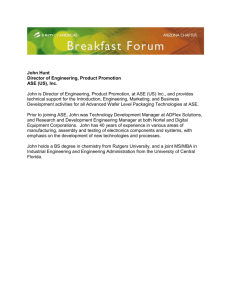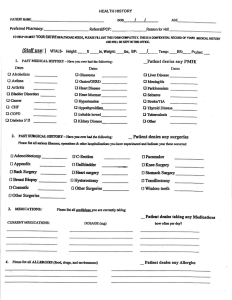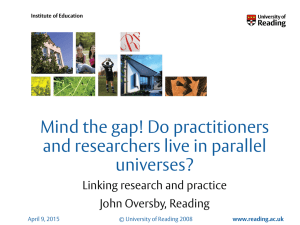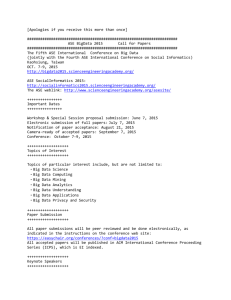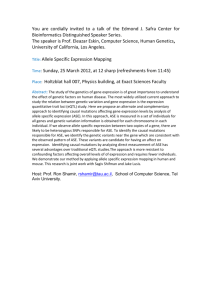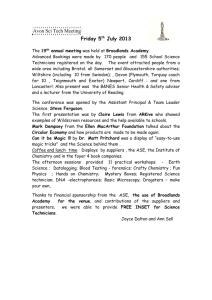communication, motivation, ownership and subversion
advertisement
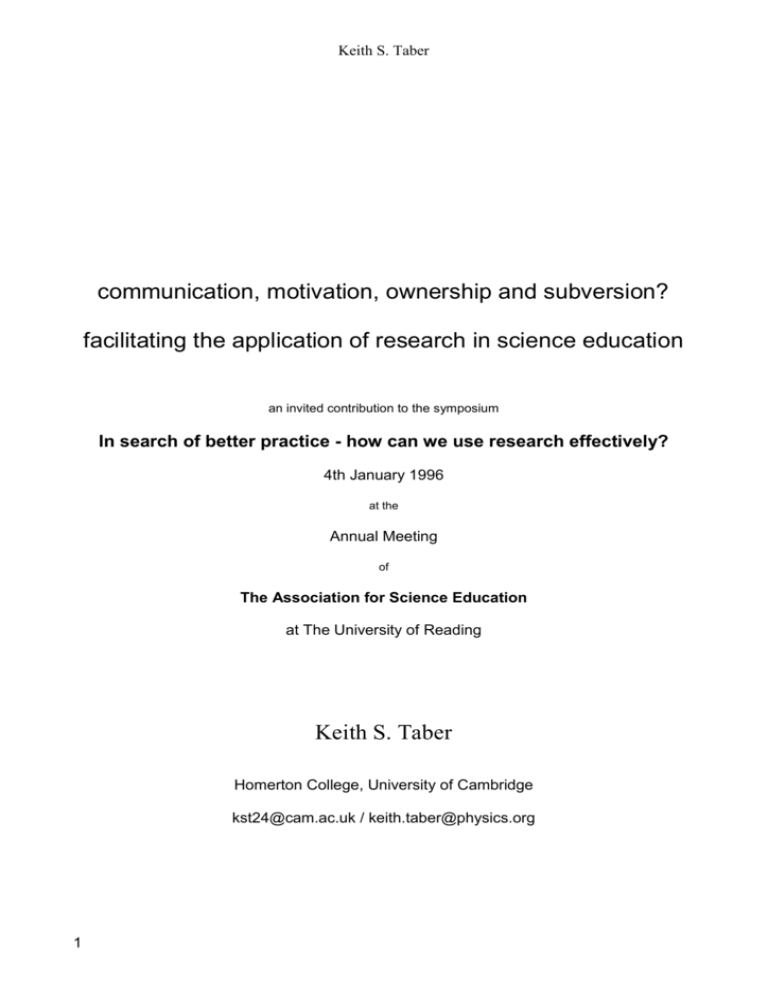
Keith S. Taber
communication, motivation, ownership and subversion?
facilitating the application of research in science education
an invited contribution to the symposium
In search of better practice - how can we use research effectively?
4th January 1996
at the
Annual Meeting
of
The Association for Science Education
at The University of Reading
Keith S. Taber
Homerton College, University of Cambridge
kst24@cam.ac.uk / keith.taber@physics.org
1
communication, motivation, ownership and subversion?
facilitating the application of research in science education.
An invited contribution to the symposium:
IN SEARCH OF BETTER PRACTICE - HOW CAN WE USE RESEARCH EFFECTIVELY?
1
Abstract:
It is argued here that, broadly speaking, educational researchers may be categorised as
professional academic researchers and teacher-researchers. The interests of these two
groups are different - and this can lead to a chasm between most educational research
and the people most able to utilize such research: classroom teachers. It is suggested that
factors such as the motivation of researchers, ownership of the research process and
"product", and the means by which research is communicated can all work against
research influencing the teaching-learning process in most classrooms and lecture
theatres.
It is suggested that a two-part strategy should be followed:
in the long-term we should work to blur the division between academic and
practitioner researchers; and work towards a vision of all science teachers as
critical reflecting practitioners who share ownership of the purposes, tools and
results of educational research.
in the shorter term we should work to build bridges across the gulf, by reviewing
the channels of communication available for researchers trying to influence
practice.
It is suggested that in order to produce significant change we may need to subvert some
distinctions that have become institutionalised in our current system. So be it!
1
The Association for Science Education (ASE) symposium "IN SEARCH OF BETTER PRACTICE - HOW CAN
has three intentions:
i) to allow participants to discuss strategies for themselves, and for the ASE, to plan effectively, implement
and disseminate research findings;
ii) to share the information collected by ASE about active research projects;
iii) to inaugurate the research interest group which ASE has in its development plan.
WE USE RESEARCH EFFECTIVELY?"
The brief for this contribution was the perspective of the teacher-researcher. I am currently a Senior Lecturer
at Havering College of Further and Higher Education, where I teach on a range of science courses. I am
also carrying out research into the development of student understanding about chemical bonding, and am
registered as a research student at Roehampton Institute London. I have previously taught in
comprehensive schools. In my last school I undertook a research project into girls under-representation in
physics classes.
Keith S. Taber
Two classes of educational researchers.
It might be suggested that there are two, largely distinct, groups of people researching the
processes of learning science. Some teachers in schools, colleges and other educational
contexts actively research the teaching and learning that takes place in their own
classrooms. These researcher-practitioners I will refer to as teacher-researchers. The
second group are professional researchers - academics who are employed (at least in
part) to carry out educational research. Of course this is a simplistic division, and there are
examples of cross-over, but I believe the distinction is an important one for our theme
today.
All research projects are unique - but some of the difficulties in using research effectively
may be understood by presenting brief vignettes representing these two classes of
researcher.
The professional academic researcher probably works in a university, with a significant
teaching load on H.E. courses. She is also expected to carry out research, and is partly
judged (for purposes of promotion and so forth) by the perceived quality of her research.
She can demonstrate this in the normal ways: by presenting at conferences, and
publishing in peer-reviewed journals. She will probably receive more kudos if she can
publish in those journals recognised as being more academic (so a paper in the
INTERNATIONAL JOURNAL OF SCIENCE EDUCATION will be more useful on her c.v. than one in
the SCHOOL SCIENCE REVIEW - although it is likely to be read by far fewer teachers.) She
visits schools and researches real classrooms where real teachers teach real pupils. And
then she leaves. The teacher has no control over the research agenda, perhaps no
special interest in the research topic, and may well be encouraged not to change her
normal way of doing things while the research is in progress. It may even be deemed
necessary to limit how much the teacher knows about the purpose and focus of the
research. In order to have her results accepted for publication the researcher has to
ensure that her work is shown to be relevant to the existing research literature, and is
therefore explained in the appropriate technical language. The teacher will probably,
eventually, receive a complimentary copy of the published paper - but it will be highly
theoretical, related to unfamiliar literature, and possibly presented as opaque statistics. In
order to get past the peer-reviewers its conclusions will probably be circumspect and
provisional, so that hints of the potential practical consequences are limited to a few lines
of speculation. The only other practising teachers who are likely to read the results are
those who are reading for higher degrees in education: those few who have the time and
energy for such activities, and can afford - or persuade their employer to afford - the fees.
The teacher-researcher is quite different. For one thing the purpose of her research is to
improve some aspects of her own professional experience which she is not satisfied with.
Her action-research approach does not require a particular rigid and theoretically-justified
methodology. She is not concerned with publishing her results - just doing the job better.
She is not even concerned with justifying what she means by "better", and how she
evaluates the effect of her actions to decide if she has succeeded. Of course all teachers
follow this process all of the time at the micro scale - change the order of presenting X and
Y, write some new questions about Z, and drop that experiment that never works next time
round - and most would probably not call it research. They are being reflective
practitioners - or just trying to be good teachers! The teacher will probably only
conceptualize this as research - if at all - when the perceived problem, and the changes
that are needed, are seen to be on a larger scale than the day-to-day minutiae of doing
3
communication, motivation, ownership and subversion?
the job. Perhaps the intended action requires the permission of the head of department, or
perhaps the problem and action are even a departmental project. In these cases the
research may be recorded and even evaluated in some way. However the practical action
taken to address a specific, locally defined, problem is unlikely to be written up in a way
which will be communicated outside of the context of the school or college. 2
I suggest that there is a lot of research going on in science education - and most of it is not
having much effect on most science teaching. The outcomes of work undertaken by the
professional academic researcher are generally publicly available. But the problems are
largely defined and addressed in abstract, theoretical language, in journals that teachers
do not read (and indeed are often too expensive for schools to purchase.) This research
often does not seem to address the everyday concerns of the busy, stressed, and tired
teacher, who has more urgent calls on her time.3 Most of the action research that takes
place occurs at a local level, and may have significant effects on the small number of
teachers and learners involved directly in the project, but is not communicated outside of
its original context.
If this all seems rather helpless it is only fair to point out that there are exceptions to the
picture I have presented.
Sometimes academic researchers may be contributing to a major national project, which
could have an influence on curriculum decisions. I would like to think that the enormous
expenditure of time and effort involved in the government sponsored Assessment of
Performance Unit (APU) activities, and the ASE"s own Secondary Science Curriculum
Review exercise informed the National Curriculum that has been implemented in England
and Wales. Certainly bodies like the ASE (and the Institute of Physics, the Royal Society
of Chemistry etc.) do lobby policy-makers, and one would certainly expects these
organisations to be influenced by educational research. However, we all know that policy
makers do not always act on our advice. 4
The second positive note is that there is some cross-over between the science teachers
and the academics. For example, from the University side, The Children"s Learning in
Science Project (CLiSP), directed by Prof. Ros Driver at Leeds University, was informed
by action research principles, and made sure that schools were fully involved in the
research process. 5 The teachers of classrooms being researched were invited to be coresearchers, and some teachers were actually seconded into the research team for
periods of time. Where teachers share in the perception of the research problem, and the
planning and analysis of research, they will feel they have ownership of the research, and
it is likely to permanently effect their teaching behaviour in a way that does not happen just
2
Action research is now a widely accepted notion, and its merits and limitations have been well
documented. For anyone interested in reading beyond this brief vignette the following books are just a few
among many: Carr & Kemmis, 1986; Elliott, 1991; Kincheloe, 1991; McNiff, 1988; Hustler et al., 1986. Some
of the points of debate about the action research approach may be found in Hammersley, 1986.
3 This is of course a simplistic analysis - for example see Hultman & Hšrberg, 1995.
4 No less an authority - and government adviser - than Prof. Paul Black has said (about the influence of
research into assessment on the National Curriculum),
"Policies here are notoriously ill-informed about the exigencies of reliable and educationally
helpful assessment, as any study of our recent policies for England and Wales will show.
Political agencies are too ready to over-ride expert advice"
Black, 1994, p.2.
5 A number of CLiSP publications discuss this aspect of the work - for example Johnson & Driver, 1991.
Keith S. Taber
by being the subject of research activity. Indeed, it is certainly appropriate in some
situations to consider involving pupils and students as participants, rather than subjects as co-learners if not co-researchers (Taber, 1994.) Other projects have attempted to use
such collaborative approaches: the Girls into Science and Technology project in the
Manchester area, and Nottinghamshire"s Girls" Education in Mathematics, Science and
Technology project come to mind. (Such projects have relied on a degree of cooperation,
or more, from Local Education Authorities (LEAs), and it might be asked whether it would
be possible to replicate them at the present time of reduced LEA budget and influence.)
The CLiSP project has also attempted to influence teaching beyond the project schools by
producing inexpensive reports of its research aimed at practitioners. In particular, CLiSP
produced thin A5 booklets that summarised findings for teachers who did not have time to
read the full reports, 6 as well as a booklet of recommended teaching strategies (Needham
& Hill, 1987.) Certainly user-friendly communication is one important way that research
results can influence teachers and schools.
There is also cross-over from the teacher-researcher side, and here-in lies an admission. I
was asked to contribute to this symposium from the perspective of the teacher-researcher,
and yet I do not think I can claim to be a typical example in the sense of my vignette
above. Indeed, the very fact that our chair-person knew of me, and something of the
research I have carried out, means that I should not be considered to be a good example
of the isolated teacher-researcher struggling to overcome classroom problems completely
apart from the world of academic research. I am sure there are many more suitable people
who could be making this presentation, but by definition they are not known to us.
I can claim to share some of the problems that most teacher-researchers face: I am not
given any regular time at work to do my research, and it obviously would not be
acceptable for me to ignore my other professional responsibilities (in my own case that
currently includes nine classes following eight different courses, at various levels, and a
tutorial group, as well as a significant administrative load), I have no administrative or
secretarial support for my research, and I do not have a research budget. I suspect that is
typical of most teacher-researchers. However, I am privileged to have worked in schools,
and now a College, where my research has been valued, and to some extent supported.
In particular in my present post I have been financially supported to enrol as a part-time
student so that I could receive research training, advice and some sense of induction into
the research community. Local Education Authorities and schools are certainly finding it
difficult to support such activities. I am fortunate to have been working in a College that
itself has a foothold in H.E., and consequently has a policy of supporting some small-scale
research activity.7 With the current financial and industrial relations climates in the F.E.
sector it seems unlikely that many college will be actively looking to increase support staff
for take research degrees, nor perhaps that a great number of staff will be seeking to
increase their existing work-related commitments in this way.
My own motivation in originally commencing research was partly to address a specific
"problem" perceived in the school where I was working at the time; but I also wanted to
further my own intellectual development, and to add to my qualifications (i.e. a Masters
degree.) It was this aspect of my motivation that led to me formally writing up my research
activities and subsequently publishing some of the results in the literature. My current
6
The ASE produced similar summary reports based on APU findings.
In particular I am fortunate to have the support of library staff who are particularly helpful, and always
prepared to try and obtain items I want to read.
7
5
communication, motivation, ownership and subversion?
research still has an action-research flavour, but was sparked by an interest in aspects of
learning science, and a general desire to be a more effective teacher, rather than a
particular "problem". Like many teachers I am concerned to understand more about the
learning process in my subject (and research can be an addictive activity!) However I still
have the external motivation of attempting to further my qualifications (i.e. working toward
a doctorate), and have by now been socialized somewhat into the "norms" of the
academic researcher. For most teachers giving conference presentations and publishing
articles and research papers are peripheral - if not off-beat - activities.
If most teachers could be supported to read for research degrees in education then there
would be much more awareness of educational research results in schools and colleges,
and much more of the informal action research that currently goes on would be written up
and published. Of course this is not likely to happen in the foreseeable future - and many
practising teachers (even good ones who strive to become better practitioners) would not
be interested in this route. So a different approach is needed.
The analysis so far has suggested that academic research is generally not carried out in a
way which involves many teachers; and tends to be reported in ways which busy
practitioners would find obscure (both in terms of the language used and the journals
themselves.) Teacher-research is often locally focussed, context-bound and goes
unreported. Registering for research degrees ensures that teacher-researchers read the
literature, and report their work (if only in dissertation and thesis form), but is only likely to
be a bridge taken by a minority of science teachers. It might be asked whether these
teacher-researchers might "cascade" their findings through formal and informal
discussions with colleagues. I am sure a lot of this goes on - but it is a process that will
never spread research results far before the information is degraded to anecdotal status.
In my own experience, where research was a response to a departmentally identified
problem, and was supported by school management there was at least the opportunity for
school-wide implementation of ideas. However, even when our colleagues support and
encourage a personal research project, they may not be able to commit much time to
considering the results of our deliberations.
Keith S. Taber
A strategy for using research more effectively.
My conclusions from these brief thoughts are that we should have two aims. In the short
term the ASE should review the channels of communication that are available between
three groups: academic researchers, teachers researchers and science teachers in
general. This may mean additional channels are needed, or that the flow of information
needs to be assisted.
In the long term I suggest we work towards something more subversive: to break down the
barriers and distinctions in the science education community between those teaching
science at various levels, and the "education" specialists.
One way this could be done would be to encourage more dual appointments: that those
who are interested (and conveniently located!) could be encouraged to work part of the
week as a science teacher, and partly as a science education tutor. I know of one H.E.
institution which seeks to complement its permanent science education lecturers by
buying in additional staff from schools for one or two days per week. This interchange
could be valuable for both partner institutions, providing care is taken to select suitable
staff.
I would also suggest that as much of a teacher"s day-to-day work involves problemsolving activities that would benefit from some research training, then all initial teacher
training should include some basic introduction to research activities so that teachers have
the confidence to see themselves as researchers.8 Small scale "research" activities could
be built into school visits. Where these involve working with individual learners and small
groups of pupils they could be a useful bridge between observation and teaching practice.
Perhaps a small dissertation should be part of the requirements for teaching
qualifications? Certainly if teachers are trained to write-up small-scale research, and to
base such work in the literature, these habits may stay with them. Eventually we might see
a limited amount of research activity as much a part of a teacher"s role as lessonplanning, exposition or assessment. Perhaps in such a context it will be the norm for
teachers to chose to develop their powers of critical reflection by registering for a higher
degree after a few years of teaching experience.
This may seem as a somewhat utopian vision, but if it were thought a worthy aim, then the
ASE could slowly work towards it. In the meantime, and from a slightly more mundane
perspective, how can we increase communication within the present context?
Some suggestions for improving the communication channels.
Effective writing implies writing with an audience in mind. The audience that we have in
mind for finding out about (and hopefully therefore taking on-board) educational research
is teachers of science at all levels. Probably the nearest we have to a journal aimed at
such an audience is the SCHOOL SCIENCE REVIEW (SSR) - although its very name seems to
exclude college and university science teachers. The SSR does publish educational
research, but perhaps some of its major articles are too long for many teachers to read
them in full, and its shorter pieces are easily missed in the mass of information in each
8
Such an approach has been developed as part of a B.Ed. programme at the University of Wollongong,
New South Wales (Booth et al., 1995.)
7
communication, motivation, ownership and subversion?
issue. Certainly it is a journal that some academic researchers and some teacher
researchers do already contribute to. However, much valuable research is either published
elsewhere (or - in the case of teacher-research - not at all.)
I suggest we need mechanisms whereby we provide:
1) a review of published science education research:.
Significant research that is published in the more technical journals can be reported in a
form more suited to a wider audience of science teachers. This could be done in one (or
more) of three ways:
a) the original authors could be invited to produce a shorter, less technical report of their
research - perhaps c.1000 words.
b) an author could be commissioned to review recent research in a particular area for the
wider readership. The journal STUDIES IN SCIENCE EDUCATION already publishes some
excellent review-type articles, but we would be looking for shorter and less detailed
reviews - intended to whet the appetite; and give an overview, rather than a detailed
critical analysis.
c) a compilation of brief notes could be provided, where research reports could be outlined
in a paragraph or two (an approach that has been used by EDUCATION IN CHEMISTRY, but
with reference to chemical rather than educational research.)
In each case the aim would not be to compete with the existing journals such as
INTERNATIONAL JOURNAL IN SCIENCE EDUCATION, STUDIES IN SCIENCE EDUCATION, RESEARCH
IN SCIENCE & TECHNOLOGY EDUCATION etc., but to supplement them by reaching teachers
who do not have time for, or easy access to, such periodicals. Full citations to the primary
literature would be given, and one would hope that one outcome would be a greater
readership of the original papers.
Although this "SCIENCE EDUCATION RESEARCH DIGEST" would inform science teachers, it
would not be a substitute for reading the original papers for those undertaking academic
research.
Perhaps this "digest" would appear in the SSR. However it might be more appropriate to
publish in a separate format. (I know the ASE has been reviewing its journals and a
science education research journal has been mooted.)
I believe people could be encouraged to write these reviews and research notes. For one
thing distilling research findings into a teacher-friendly form might be considered a suitable
form of publication for those working in science education departments in H.E. - especially
perhaps those who prefer to concentrate on teaching rather than being active in research
themselves. Research students in science education who are undertaking literature
searches might well be encouraged by supervisors to contribute short reviews of their
research field: this could be good practice in writing for a wide audience, and in learning to
interpret and simplify complex ideas; and might make useful interim targets on the road to
the literature chapters of dissertations and theses. Many authors of key original research
papers might be pleased to provide a shorter less technical summary of their papers. If
they are too busy, or find it difficult to adjust to the wider audience, they might well agree
to a "collaboration", where the original paper is edited and re-written by someone in the
ASE. Subject to approval of the text by the original author, the rewritten piece could then
be published as co-authored - a process which is not so different from the way many cowritten papers are gestated anyway.
Keith S. Taber
2) support for new authors.
Another form of collaboration would be to encourage teacher-researchers who have no
particular time or motivation for publishing their work to communicate it. Many teacher
researchers might be nervous of writing for publication, or simply not see themselves in
this role, yet would be happy to share the benefit of their experiences with other science
teachers. Again if such people could be encouraged to make an initial contact with us
(through regular notices in ASE publications), the ASE could help them communicate their
work. Someone experienced in writing, and interested in the topic, could meet with the
teacher and talk about their research. A brief report would be prepared by the writer,
approved by the teacher, and then published under their joint names. (It might even be
possible, if not entirely desirable, for the whole process to be accomplished by a
combination of telephone conversations and postal correspondence.) The report would be
quite pithy, but would give a contact address where interested parties could write if they
wished to correspond with the teacher-researcher. Teachers with similar problems, and
academic researchers with an interest in the topic, could find this useful.
In both 1) and 2) the aim is to provide short accounts which maintain the readers" interest,
and get them reflecting on their own practice. One would hope that enlightened heads of
science departments might raise the articles as agenda items for departmental meetings,
or even adopt these materials to use for in-house staff and curriculum development. By
making sure that our "digest" provides readable, interesting and relevant reviews; and that
it reaches advisors, inspectors and ITT and InSET tutors (by a complimentary mailing
list?) we could hope that teachers will be encouraged to take up new ideas.
The requirements for these proposals are:
somewhere to publish - in SSR or elsewhere;
an editor;
a team of experienced researchers and/or writers who are interested enough in
science education research to write reviews, and co-author short pieces.
(Perhaps we might wish to facilitate a wider research support net as well?)
an editorial board to assist the editor as referees etc. 9 This might well be - in full
or part - the same people as in the previous category.
so that we can involve members at all levels it may be appropriate for the ASE to
take subscriptions to other journals for our writers who may not have access to
them (with a different member reviewing articles in each major journal.)
Assuming we publish in the SSR, or whatever new journal the ASE plans to introduce, the
cost would be minimal: train fares/petrol money; a small number of journal subscriptions,
stamps and costs of telephone calls, and maybe some stationary. Perhaps the effect could
be considerable. It is important that this material go to all members of the association
without additional subscription. It should also be edited in such a way that the major
practical applications and consequences of contributions are clearly summarised on a
single contents page for easy reference. The journal should be slim enough so that
readers are not put-off before opening it, and it should be set-out in a style that
encourages the "skimming" readers to explore articles further.
9
As the "digest" will not be competing with the existing journals (that is publishing original highly
technical research papers) the referees will have a different brief to those asked to peer-review research for
the academic journals. Our referees will be looking primarily for readability, relevance to classroom teachers,
clarity of exposition, etc. It may be appropriate for these referees to make editorial changes in submissions
to speed up the production schedules, rather than return them to authors for changes. (Obviously authors
would have to be aware of this policy in advance.)
9
communication, motivation, ownership and subversion?
My final suggestion is on a slightly different track. Most science teachers use textbooks. I
expect virtually all teachers turn to textbooks when preparing a new topic, and most issue
or recommend books to pupils and students. If teachers themselves have little time for
reading research reports, then we should at least do all we can to ensure that authors of
science textbooks are aware of research results. I suggest that the Association should
lobby publishers to ensure that we are aware of all new texts being produced by the major
publishing houses at an early stage in their preparation. We can then approach authors to
ensure they are informed about research which could improve aspects of the book. Would
the ASE research interest group even be seen by publishers as an appropriate group to
act as consultants? Perhaps they would sponsor our activities in return for our advice? Of
course some research in science education does not particularly inform text-book writing but some should, and through popular books we could potentially influence the teaching of
many teachers, and the learning of many learners.
In conclusion:
To summarise then, I suggest we aim to subvert the distinctions between the science
teaching and science education research communities so that we all perceive that we
have ownership of the purposes, practices and results of research. Until we achieve this
we must be aware of the motivations of academic researchers (who are expected to
publish in the most esteemed journals), teacher-researchers (often concerned with the
practical results of their actions in their personal professional context, with little motivation
to publish and disseminate findings) and the vast body of science teachers at all levels
(who are motivated to teach well and effectively, but can not afford the time to read long,
technical, and largely theoretical treatises to inform their professional practice.) We should
provide some form of "SCIENCE EDUCATION RESEARCH DIGEST" along the lines suggested as
a channel for communication between these groups. We should actively commission
periodic surveys of developments in all the main areas of research in science education.
We should be proactive in encouraging academic and teacher researchers to contribute to
such a publication, and should be prepared to co-write articles for our target audience (i.e.
science teachers at all levels.) Finally we should ensure that our "digest" is brought to the
attention of teacher trainers, advisors and inspectors, committees lobbying policy makers,
publishers and textbook authors.
Keith S. Taber
references:
Black, 1994:
Black, Paul, Looking out or looking in - assessment research and science education, paper presented to the symposium
"The contribution of research to school science education", British Educational Research Association Conference,
Oxford, September 1994.
Booth et al., 1995:
Booth, Edward, Vialle, Wilma & Hall, Neil, ÒWe need more of it and earlier!Ó:ÊStudent perceptions of the value of
research and inquiry in undergraduate teacher education, paper presented at the European Conference on Educational
Research, University of Bath, September 1995.
Carr & Kemmis, 1986:
Carr, Wilfred & Kemmis, Stephen, Becoming critical: education, knowledge and action research, London: The
Falmer Press, 1986.
Elliott, 1991:
Elliott, John, Action Research for Educational Change, Milton Keynes: Open University Press, 1991.
Hammersley, 1993:
Martyn Hammersley, Controversies in Classroom Research (2nd Ed.), Buckingham: Open University Press, 1993.
Hultman & Hšrberg, 1995:
Hultman, Glenn & Hšrberg, Cristina, Teachers" informal rationality: understanding how teachers utilize research
knowledge, EERAÊBulletin, 1 (2), August 1995, pp.3.-10. {reprinted from Science Communication, 16 (3)}
Hustler et al., 1986:
Hustler, David, Cassidy, Tony & Cuff, Ted (Eds.), Action research in classrooms and schools, London:ÊAllen &
Unwin, 1986.
Johnson & Driver, 1991:
Johnston, Kate, & Driver, Rosalind, A Case Study of Teaching and Learning about Particle Theory: a
constructivist reaching scheme in action, Children"s Learning in Science Project, Leeds: Centre for Studies in
Science and Mathematics Education, University of Leeds, 1991.
Kincheloe, 1991:
Kincheloe, Joe L., Teachers as researchers: qualitative inquiry as a path to empowerment, London:ÊFalmer Press,
1991.
McNiff, 1988:
McNiff, Jean, Action research: principles and practice, London: Routledge, 1992 (first published by MacMillan,
1988.)
Needham & Hill, 1987:
Needham, Richard, in association with Hill, Peter, Teaching strategies for developing understanding in science,
Children"s Learning in Science Project, Leeds: Centre for Studies in Science and Mathematics Education, University
of Leeds, June 1987.
Taber, 1994:
Taber, Keith S., ÒThe teacher-researcher"s duty: accounting for ourselves to our co-learnersÓ, paper presented at
"Accounting for Ourselves", World Congress 3: Action Learning, Action Research and Process Management,
University of Bath, July, 1994. (An abridged version of this paper is published in the proceedings, edited by Laidlaw,
M., Lomax, P. & Whitehead, J., pp.230-233.)
11
